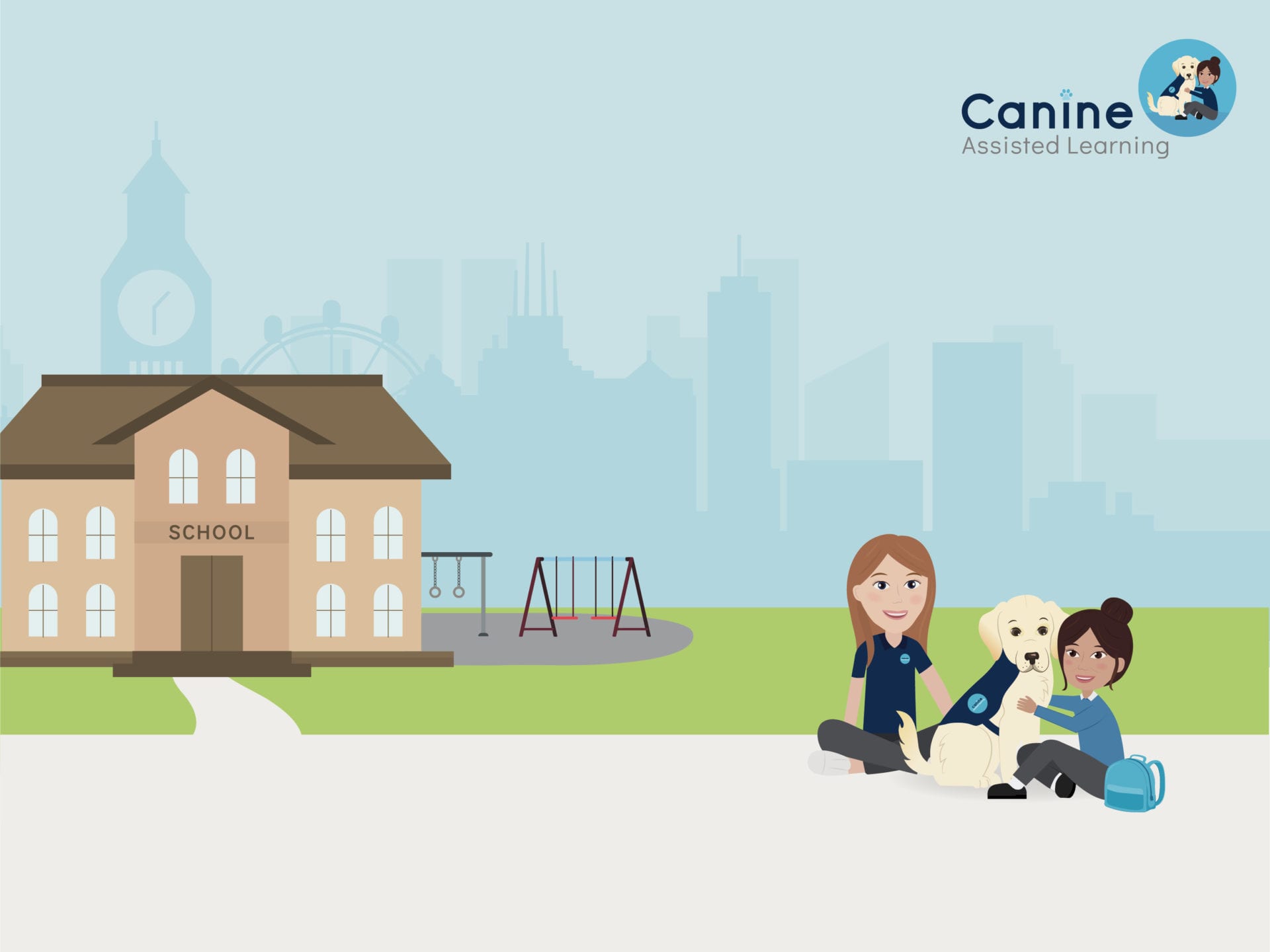

Canine Assisted Learning offers our specialist services to Schools, Colleges and Universities. We pride ourselves for being at the forefront of animal assisted interventions in the UK offering a range of services to suit the needs of every establishment.
Talking Therapies
CAL animal assisted talking therapies offer a progressive and innovative therapeutic approach that engages young people through the development of the human animal bond. This has proved to be of huge benefit to those who struggle to engage in traditional talking therapies.
Our approach offers a different way of exploring difficult and sensitive issues, making it easier for the young people we work with to express their feelings and recount painful experiences. Our highly trained CAL dogs help create a calm and peaceful environment enabling our sessions to be of maximum benefit. We provide talking therapies to help with the following:
- Depression
- Anxiety
- Eating disorders
- Self harm
- Coping with change
- Working through traumatic and upsetting experiences
- Self regulation
- Bereavement
An intervention example: Lily, Senior CAL Dog
“Lily’s involvement was greatly acknowledged when we were able to work with a young person who was selectively mute and felt no-one other than Lilly, was safe enough to trust. This young person had not spoken in over two years and struggled to engage with any other therapies. Following a referral, in our first session Lilly’s presence immediately helped calm and contain the anxieties of this young person.
Whilst Lily is able to comfort and ‘hold’ the emotions in the room, it is the partnership between dog and therapist that truly helps see the results. With Lilly supporting the young person, they were able to engage with the therapist and build up a strong, working, therapeutic relationship. Over time, using an integrative counselling and animal assisted approach the young person was able to regulate and understand their emotions, whilst understanding the trauma that lay beneath. With many selectively mute individuals, a trigger can be initiated from a traumatic event. For this individual, being able to work with the therapist to replay and re-frame these events were necessary for any verbal communication to begin.
This also further improved additional challenges such as flashbacks and panic attacks. After further work, the therapeutic relationship was strong enough for the individual to feel they could communicate a word verbally. Starting small. Speaking to Lilly once a week allowed the process to begin and furthermore resulted in the individual trusting the therapist enough to communicate these worries.. Once this happened, the life of the individual began to greatly improve. Being able to form this therapeutic relationship and begin to communicate verbally meant other services were also able to be engaged.
Whilst this highlights some of the work that the therapist does, it would not have been possible if Lily was not there to make that individual feel safe enough to engage. Many young people feel they cannot relate and trust new people. However, dogs have the innate ability to comfort these uncomfortable feelings and to tolerate this whilst working therapeutically.
Thank you Lilly for supporting young people who fear the idea of ‘therapy’ and to comfort them whilst on this journey.”
Emotional Regulation
We work with young people who for many different reasons struggle to recognise, regulate and control their emotions and in turn their behaviour. Working with the young people on our emotional regulation programme helps them to explore how they are feeling, understand why they are feeling that way and start to put strategies in place to effectively manage their anger and outbursts.
Specialist CAL practitioner teams work on an individual basis focusing on social, emotional and behavioural intervention strategies. The aim is to help young people understand and regulate their emotions and behaviour by providing a safe, non-judgemental space to explore different emotional reactions and provide psychoeducation about different behavioural strategies.
Research has demonstrated that youths in residential care displayed more secure attachment following an animal-assisted intervention (Balluerka, Muela, Aminano & Caldeney, 2014).
“Thank you again for working magic on X last week. We have been trying to integrate her into STARS for a number of weeks and have only managed to get her to the reception desk. Wednesday was the first time she had fully entered the building and the fact she stayed with Lilly for 30 minutes was incredible. The next day she came to a maths lesson for 10 minutes! Lilly has also worked wonders on X during her English mock exam, calming her down enough to re-enter the exam and complete the paper.” Anne Farringdon, STARS school
Literacy Interventions
While our presence in classrooms has a hugely positive general effect, we achieve fantastic results when working one-to-one and specifically targeting areas students are finding difficult—in particular literacy.
We have seen children who had fallen far behind by previously refusing to engage in reading activities improve by a great degree and—perhaps more importantly—genuinely start to enjoy reading and the world of books. We help young people look forward to reading, to be proud of their achievements and become excited about choosing their next book.
There have been many studies looking into the positive effects that therapy dogs can have on the literacy levels of children and we have seen the positive results of these for ourselves. We have worked with children of many ages, backgrounds and abilities, and we’re proud to be able to say that all of them have increased their reading accuracy and their reading comprehension ages as a direct consequence of our attendance.
AAI practiser Claire Pickersgill shares an example of her interventions along with CAL dog Lilly:
“I’ve been working with a child who’s reading age improved by 1.5 years and reading comprehension improved by 2.5 years within a 3 month period. It was through her engagement with Lilly that her confidence grew and her progress excelled.
I’ve also been working with another young person whose anxiety was preventing her from attending school. By introducing her to Lilly, she was able to help her feel calm and confident and talk through her anxieties. She attended short sessions that increased over time and she’s now confident enough to attend lessons alongside her peers.’
Mrs Orton, Year 6 Class Teacher, shares one of her experinces working with CAL
“As a teacher in a special needs school, I can thoroughly recommend Canine Assisted Learning. I have witnessed their ability to calm and alleviate tension in very over-anxious pupils in crisis, in a caring and empathetic manner. The special bond that pupils form with the dog enables them to be themselves in a safe environment, which in turn encourages dialogue from children who have shut down along with the understanding of empathy of others. The benefits are huge on both a physical and emotional level”.






